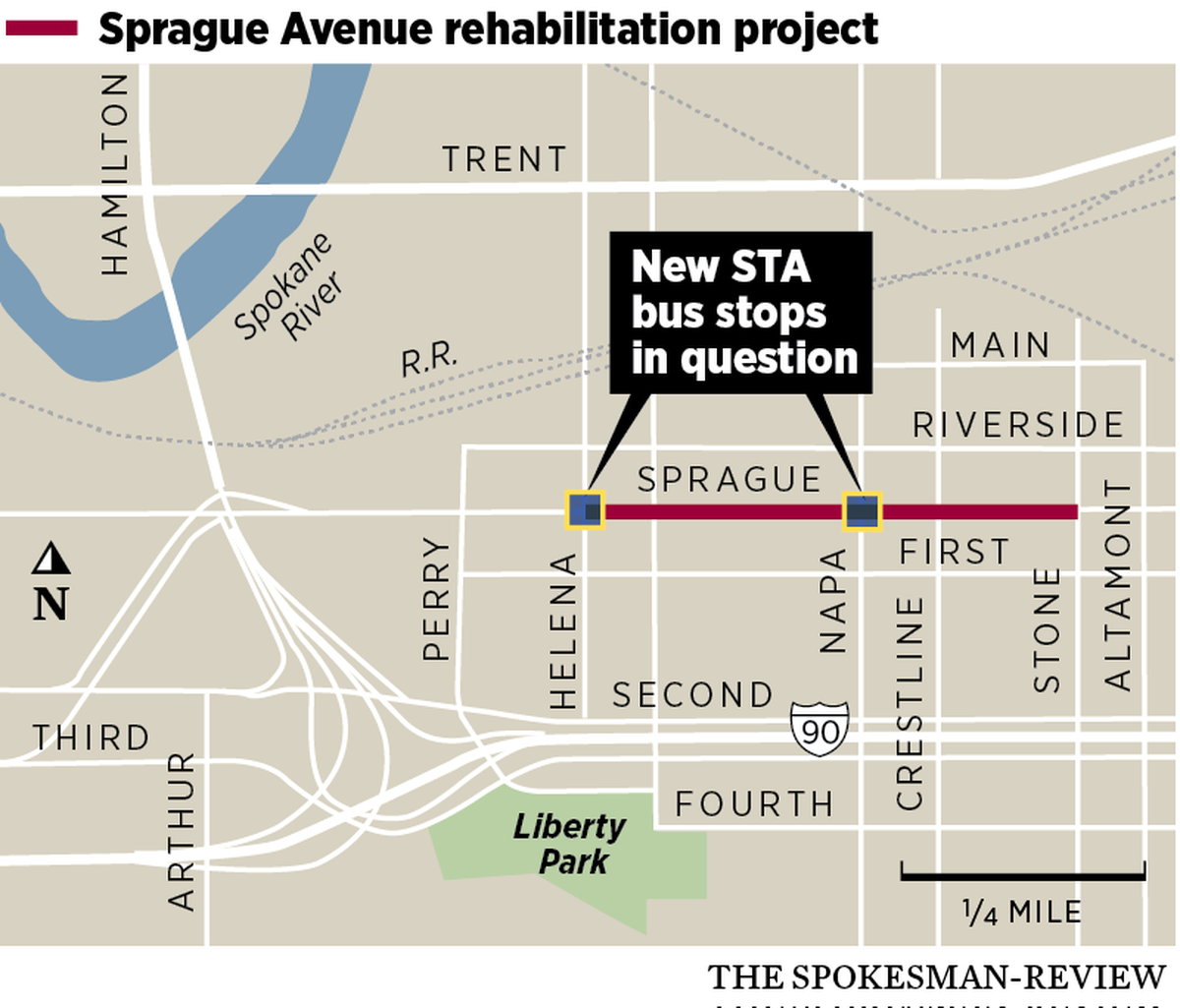Buses still won’t have to pull over at bus stops in East Sprague business district, STA board decides
Al French speaks during an STA meeting on Thursday. The city of Spokane has asked the Spokane Transit Authority to remove the new bus stops on East Sprague Avenue, at Helena and Napa streets, following complaints of traffic congestion by business owners. (Tyler Tjomsland / The Spokesman-Review)Buy a print of this photo
Buses will continue to stop in the lane of traffic on East Sprague Avenue, a victory for the Spokane Transit Authority and its plans to build a “high-performance transit” network on its busiest and most popular routes with transit stops like those on East Sprague.
The decision made by STA board on Thursday followed a contentious discussion that pitted Spokane Mayor David Condon, who runs the city where the network will largely be located, against Spokane County Commissioner Al French, a longtime transit advocate.
Even though the STA said the board “essentially” made a decision to reject a request from the city to move the stops, the business association that spurred the city’s request said the board sidestepped the issue and called it a “decision not to decide.”
At the end of the meeting, the board voted to approve an idea from French to give bus drivers the ability to control traffic signals located next to the stops, a “compromise” intended to decrease conflict between motorists and buses.
With that vote, STA officials say the board basically approved of allowing buses to continue stopping “in-lane” at the four stops on Sprague. That vote came after the board turned down a recommendation to reject the city’s request.
The two votes followed the East Spokane Business Association taking its concerns about traffic jams and loss of customers to Condon. The group blamed the bus stops, and Condon agreed that STA should move the modern and costly bus stops – a new type of raised-level platform designed for STA’s high-performance transit lines. The four stops on Sprague cost a total of $188,000 to install.
Two weeks ago, STA’s planning and development committee voted unanimously to reject the request from Condon’s administration to move the stops and sent their decision in a recommendation to the agency’s full board of directors, leading to Thursday’s vote.
The unanimity of the committee, however, was not carried over to the full board, or the line of people who testified at the meeting.
Larry Stone, president and CEO of SCAFCO, took to the lectern to argue in favor of moving the stops, and said STA should be open to fixing what he called a “mistake.”
“In my business, we change our minds all the time. If we make a mistake, we change our mind. It’s a good thing. Changing your mind in government is not a bad thing,” said Stone, whose company purchased Playfair Commerce Park, just off Sprague, from the city for $2.1 million in 2009. “We’re creating a disaster for hardworking businesses … because we don’t want to admit we made a mistake.”
Karen Sutula, who was chairwoman of the East Central Neighborhood Council during the street’s renovation, said the “deep pockets” of the local business association were drowning out the voices of residents.
“We all use the bus. And we all love the new bus stops and the walkability of the area,” she said. “That’s the voice that’s missing in all the studies and statistics. No one’s gone door to door and asked what we think. … I ask you to think about the residents.”
The general lack of agreement was described by French.
“Some folks just don’t like STA. Bottom line. They don’t like public transportation. They don’t use it. Never will. Never have,” he said. “Some don’t like road diets, because of the delay it causes and the constriction of transportation corridors. Some don’t want parking stalls eliminated in front of their business. Some don’t want bus stops in front of their stores. Others are very pleased with the changes.”
French, a former Spokane City Council member who has long been involved with STA, was clear on where he stood: He supported keeping the bus stops where they are and suggested that complaints that they increased traffic congestion were nonsense.
“If traffic congestion is a concern, I find it interesting that there’s not a likewise complaint about the traffic lights,” he said, noting that by his math, buses cause 1 minute of delay every hour while red lights cause 18 minutes per hour. He also said it was wrong to use traffic counts as an indicator of a retail district’s viability.
“Cars driving by their store with people focused on not hitting the person in front of them don’t generate shoppers. The other thing is, cars don’t buy anything,” he said.
As a “compromise,” French recommended moving the transit agency “into the 21st century” by allowing bus operators to trigger a red traffic signal when making a stop.
The Sprague bus stops are located just beyond the intersections, which have led to complaints that people get stuck behind a stopped bus in the middle of the intersection. With control of the signal, French said, motorists would instead get stopped at the red light. It also would avoid the recommendation to have buses pull out of traffic, which would lead to them having to “fight” to get back into the lane of travel, he said.
French’s recommendation, which did not explicitly address the city’s request to move the stops, was approved 7-2, with Condon and County Commissioner Josh Kearns voting no.
STA CEO E. Susan Meyer said bringing such technology to city streets would require the approval of STA and the city in which the street was located. Condon responded by pointing out the “irony” of the board rejecting the city’s request with a recommendation that needed the city’s approval.
“Isn’t it ironic that it has to be agreed upon by the jurisdiction that has authority over the right of way?” he asked.
French responded: “You’re right. It does require cooperation between the transit agency and the city. So I would hope that we would be able to work on that partnership. We have a lot of things coming that are good for the overall community.”
After the meeting, LaVerne Biel, president of the East Spokane Business Association, said she didn’t think the board had made a decision but instead left room to “look at other alternatives.”
“It’s not my way or the highway. It’s not STA’s way or the highway,” said Biel, who owns a business on East Sprague and ran unsuccessful campaigns for City Council in 2013 and 2015, adding that her group will continue to lobby the city and STA to move the stops to allow buses to pull out of traffic. “They made a decision not to decide.”

